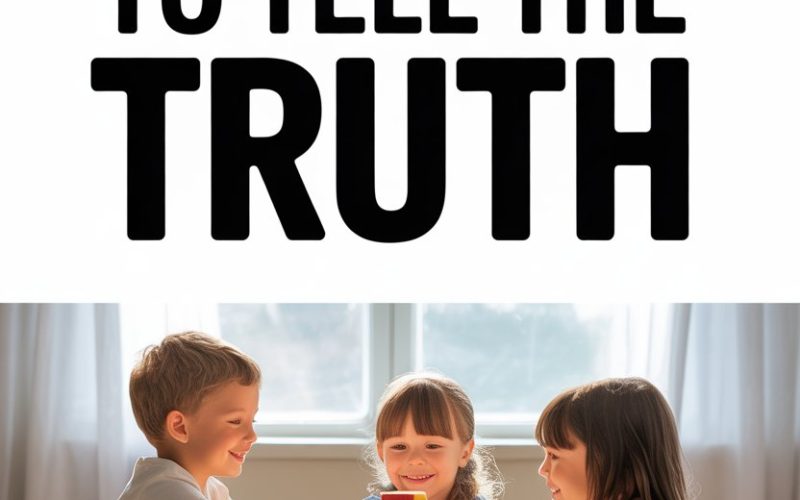Kids fib. Sometimes it’s about cookie crumbs on their cheek, other times it’s a slightly taller tale (“No, I definitely did not feed my broccoli to the dog…”).
For most parents, truth-telling isn’t just a moral ideal—it’s a practical necessity. How else are you supposed to know who actually drew on the hallway wall?
Teaching honesty doesn’t have to feel like a cross-examination under a bright light (though I’ve considered it on bath night).
Here’s how to weave a little more truth into your child’s day, without the drama—and with enough fun to keep everyone coming back for more.
1. Make Honesty a Game
Children love games. (Actually, so do adults—just ask anyone who’s hidden in the loo for five minutes of Candy Crush.)
Turning honesty into a playful challenge helps kids see truth-telling as something rewarding, not just a rule to remember.
Try “Truth or Tale,” a family favourite at our house. Each person tells two stories—one true, one made up. The rest of the group guesses which is which.
It flips fibbing on its head, showing kids the difference between a story and a statement. More importantly, it gives you a low-pressure way to talk about why honesty matters.
Research from the University of Cambridge suggests children as young as age three can distinguish between reality and make-believe when given the chance to practice.
By celebrating their ability to spot fibs, you’re helping develop those all-important discernment skills.
Don’t forget, the aim isn’t catching your child out—it’s building up their ability to choose the truth, even when it’s less exciting than the alternative.
2. Praise Truth Like It’s a Superpower
If your child fesses up to spilling juice all over your white rug (the one you specifically asked to keep juice-free), it’s tempting to groan and reach for the stain remover.
Before you do, try offering genuine praise for their honesty—even if your insides are screaming.
Research highlighted by Harvard’s Making Caring Common project shows that children are more likely to consistently tell the truth when parents value honesty over simply avoiding trouble. This means catching them in the act…of telling the truth.
Small rewards don’t hurt either. No, you don’t have to hand out chocolate every time someone admits to a mistake, but a high-five, an extra bedtime story, or a “wow, that was really brave to tell me!” goes a long way.
Over time, your child starts to build an identity as an honest person—someone who tells the truth even when it’s tricky. It’s less about fear of punishment and more about feeling good for doing the right thing.
3. Story Time with a Twist
Children’s stories are packed with teachable moments—think Pinocchio’s growing nose or the boy who cried wolf. The trick is using those moments thoughtfully, not as a scare tactic but as a way to spark conversations.
After reading, ask open-ended questions: “How do you think Pinocchio felt when people stopped believing him?” or “What would you have done if you were in that story?”
Encourage your child to put themselves in the character’s shoes, and gently guide the conversation toward the benefits of honesty.
A team at the University of Toronto found that stories emphasising positive outcomes of telling the truth (rather than just the negative side of lying) are more effective in shaping honest behaviour.
So lean into tales where characters are rewarded for their honesty—think less about wagging fingers and more about modelling integrity.
If you want to bring it home, try making up your own stories together, with your child as the main character. What would they do if they accidentally broke Mum’s favourite mug?
Watch as they start to weave honesty into their own narrative.
4. Keep Calm and Carry On (Even When the Vase Shatters)
You’re halfway through a cup of tea and suddenly there’s a crash. The prized family vase, a gift from Auntie Margaret, is now a mosaic on the floor. Small feet scuffle in the hall. It’s the classic honesty test.
The urge to interrogate is real, but a calm response is your secret weapon. Children are much more likely to tell the truth if they trust that honesty won’t be met with anger or harsh punishment.
If a confession comes your way, thank your child for being honest. Ask them how they think the situation can be fixed—can they help clean up, apologise, or make a card for Auntie Margaret?
Psychologists agree: fear of punishment increases the chance of fibbing, while calm, solution-focused reactions encourage confession and accountability.
Nobody’s saying you need to act like it’s no big deal (goodbye, vase), but showing you value honesty over perfection sets the tone for future confessions.
And if you do find yourself raising your voice, don’t panic—parents are human too. A simple “I’m sorry, I was upset about the vase, but I appreciate you telling me” can do wonders.
5. Model Honesty Every Day
Children are professional mimics.
If you tell Granny her jumper is “lovely” (when it looks like something the cat coughed up), little ears take note. If you fudge your child’s age to save a few quid on a family ticket, they’re watching that too.
Honesty starts with us, warts and all. Admit your own mistakes, apologise when you slip up, and show your child that telling the truth doesn’t make you less worthy of love or respect.
Research from the University of California, San Diego highlights how children’s honesty is strongly linked to the behaviour of their caregivers.
Even small, everyday moments—like admitting you forgot to buy milk—help normalise truth-telling.
The bonus? You’ll slowly cultivate a family environment where honesty is the norm, not the exception. (And, in a pinch, you’ll have someone to back you up when Auntie Margaret asks about her vase.)
Raising Truth-Tellers Without Losing Your Mind
Building honesty in children isn’t about rooting out every fib or running an honesty bootcamp in your living room. It’s about planting seeds—through games, stories, praise, calm responses, and, yes, a good dose of self-reflection.
Will your child still try to wriggle out of sticky situations now and then? Absolutely. That’s just part of growing up.
But the more you show that the truth is safe—and even a bit fun—the more likely your little one will come to you, paint on their hands and all, and say, “It was me.”
And isn’t that the kind of honesty that makes every juice-stained rug a badge of honour (or, at least, a story for their wedding day)?
Go on, give one of these ideas a whirl tonight. You might just find yourself smiling the next time you catch your kid in the act—of telling the truth.




